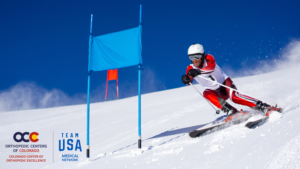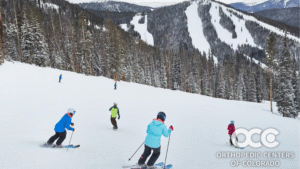Living in Colorado means living for the outdoors. From trail running, mountain biking, and climbing in the summer, to skiing, snowboarding, and ice hockey in the winter, there’s no off-season here. That active lifestyle is what makes Colorado unique—but it also means we need to take extra steps toward sports injury prevention in Colorado, especially during the transition between seasons.
Why Transitions Matter
Each season brings a different set of demands on the body. Summer activities like hiking and cycling rely heavily on endurance, balance, and repetitive motions. When winter arrives, the focus shifts toward explosive power, balance under unstable conditions, and quick lateral movements. Skiing and snowboarding, for example, put significant stress on the knees and hips, while ice sports often challenge the shoulders and back.
It’s during this switch that many athletes run into trouble. Muscles and joints conditioned for one sport may not be ready for the sudden new demands of another, leading to an increased risk of strains, sprains, and overuse injuries. Preparing your body for the seasonal transition is one of the most effective ways to stay injury-free.
Key Strategies for Injury Prevention
1. Cross-Train Throughout the Year
By mixing strength training, cardio, and flexibility work into your weekly routine, you build resilience in the muscles and joints that different sports demand. Squats, lunges, and core work go a long way in protecting the knees and hips from ski-related injuries. Yoga or Pilates can help maintain flexibility and balance, both critical for mountain sports.
2. Prioritize Warm-Ups and Cool-Downs
In colder months, muscles tighten faster, making warm-ups even more essential. A dynamic warm-up—think light jogging, leg swings, and mobility drills—can prime your muscles for high-intensity movement. After your activity, a cool-down with stretching helps prevent stiffness and aids recovery.
3. Ease Into New Activities
It’s tempting to go all-in on the first big powder day, but sudden intensity is a common cause of injury. Start with shorter, lower-intensity sessions and gradually increase the duration and difficulty. This progression allows your body to adapt without being overloaded.
4. Focus on Recovery
Colorado’s active culture sometimes makes rest feel like a weakness—but recovery is just as important as training. Adequate sleep, hydration, and rest days give your body the chance to repair and strengthen, helping you avoid nagging injuries that can cut seasons short.
5. Pay Attention to Warning Signs
Persistent soreness, swelling, or instability shouldn’t be brushed off as “normal.” Early evaluation can make the difference between a quick recovery and a long-term setback.
The Role of Physical Therapy
Physical therapy isn’t only for those recovering from injuries—it can be an essential tool for prevention. A physical therapist can:
- Assess movement patterns to identify muscle imbalances or weaknesses that increase your risk of injury.
- Design sport-specific programs that strengthen key muscle groups before ski season or build endurance for long summer trail runs.
- Improve flexibility and mobility, helping athletes adapt more smoothly between summer and winter sports.
- Support recovery after a demanding season, reducing the chance of re-injury.
Incorporating physical therapy proactively can help athletes of all levels maintain performance and avoid setbacks, keeping them strong year-round.
Common Seasonal Injuries in Colorado
- Knee ligament injuries (ACL/MCL tears): Often seen with skiing and snowboarding falls.
- Shoulder dislocations or rotator cuff strains: Common in hockey and snowboarding.
- Ankle sprains: A risk for hikers in the summer and skiers in the winter.
- Lower back strains: Frequently occur with snow shoveling combined with sports activity.
Understanding these risks makes prevention strategies even more valuable.
When to Seek Expert Care
If you do sustain an injury, it’s important to seek professional care quickly. At Orthopedic Centers of Colorado, our physicians provide comprehensive orthopedic care in Colorado, offering everything from diagnostics and non-surgical treatments to advanced surgical solutions when necessary. Working with a sports medicine specialist in Denver ensures that your treatment is tailored to your sport, your lifestyle, and your recovery goals.
Staying Colorado Strong
Colorado’s active lifestyle is a gift, offering opportunities to challenge ourselves in every season. With intentional preparation, physical therapy support, and attention to sports injury prevention in Colorado, you can enjoy those opportunities year-round—staying strong, resilient, and ready for whatever the mountains bring.







